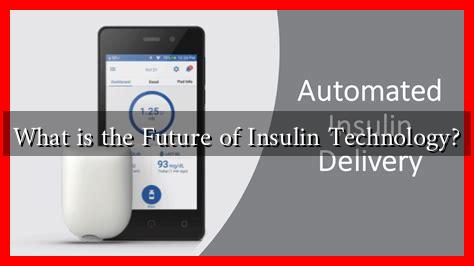-
Table of Contents
- What is the Future of Insulin Technology?
- The Current Landscape of Insulin Delivery
- Emerging Technologies in Insulin Delivery
- 1. Smart Insulin Pens
- 2. Closed-Loop Systems
- 3. Wearable Technology
- Advancements in Insulin Formulations
- The Role of Artificial Intelligence and Data Analytics
- Challenges and Considerations
- Conclusion
What is the Future of Insulin Technology?
Insulin technology has undergone significant advancements over the past few decades, transforming the management of diabetes for millions of people worldwide. As the prevalence of diabetes continues to rise, the demand for innovative insulin delivery systems and monitoring technologies is more critical than ever. This article explores the future of insulin technology, highlighting emerging trends, potential breakthroughs, and the implications for diabetes management.
The Current Landscape of Insulin Delivery
Before delving into the future, it is essential to understand the current state of insulin delivery systems. Traditional methods include:
- Insulin Injections: The most common method, involving syringes or insulin pens.
- Insulin Pumps: Devices that deliver a continuous supply of insulin through a catheter.
- Inhaled Insulin: A newer method that allows insulin to be inhaled through the lungs.
While these methods have improved diabetes management, they still present challenges such as pain, inconvenience, and the need for frequent monitoring of blood glucose levels.
Emerging Technologies in Insulin Delivery
The future of insulin technology is poised for transformation through several innovative approaches:
1. Smart Insulin Pens
Smart insulin pens are equipped with Bluetooth technology that connects to mobile applications. These pens can track doses, remind users when to inject, and provide data to healthcare providers. For instance, the Myabetic Smart Pen offers features that enhance user experience and adherence to treatment plans.
2. Closed-Loop Systems
Closed-loop systems, often referred to as “artificial pancreas” systems, automate insulin delivery based on real-time glucose monitoring. These systems use continuous glucose monitors (CGMs) to assess blood sugar levels and adjust insulin delivery accordingly. The Medtronic 780G system is a leading example, demonstrating improved glycemic control and reduced hypoglycemia rates.
3. Wearable Technology
Wearable devices are becoming increasingly sophisticated, with the potential to monitor glucose levels non-invasively. Companies like Abbott are developing continuous glucose monitoring systems that provide real-time data without the need for fingerstick tests. Future iterations may integrate insulin delivery, creating a seamless experience for users.
Advancements in Insulin Formulations
In addition to delivery methods, advancements in insulin formulations are also on the horizon:
- Ultra-Rapid Insulin: New formulations that act faster than current rapid-acting insulins could allow for more flexible meal timing.
- Basal Insulin Variants: Long-acting insulins with extended duration of action may reduce the frequency of injections.
- Smart Insulin: Research is underway to develop insulin that can automatically adjust its activity based on blood glucose levels.
The Role of Artificial Intelligence and Data Analytics
Artificial intelligence (AI) and data analytics are set to revolutionize diabetes management. By analyzing vast amounts of data from CGMs, insulin pumps, and patient behavior, AI can provide personalized recommendations for insulin dosing and lifestyle adjustments. For example, companies like Glooko are leveraging AI to offer insights that help patients and healthcare providers make informed decisions.
Challenges and Considerations
Despite the promising advancements, several challenges remain:
- Cost: Innovative technologies can be expensive, limiting access for many patients.
- Regulatory Hurdles: New devices and formulations must undergo rigorous testing and approval processes.
- Patient Education: Ensuring patients understand and can effectively use new technologies is crucial for success.
Conclusion
The future of insulin technology is bright, with numerous innovations on the horizon that promise to enhance diabetes management. From smart insulin pens and closed-loop systems to advancements in insulin formulations and the integration of AI, these developments aim to improve patient outcomes and quality of life. However, addressing challenges such as cost, regulatory hurdles, and patient education will be essential to ensure that these technologies are accessible and effective for all individuals living with diabetes. As we move forward, the collaboration between technology developers, healthcare providers, and patients will be vital in shaping a future where diabetes management is more efficient and less burdensome.


